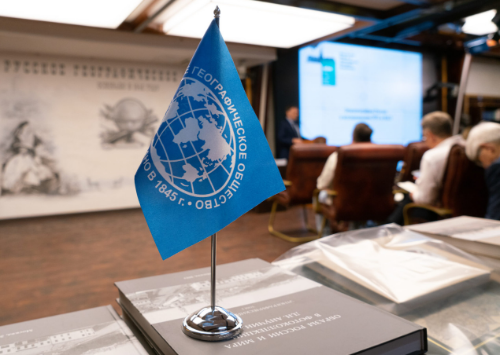The Russian Geographical Society has announced the results of its 2025 Grant Competition. RGS grants are endowment funds allocated for basic and applied research, educational publishing, and media projects targeting the Society's goals and objectives.
This year, 39 regional and 45 open-call grants were awarded through competitive selection. Scientists from the Karelian Research Centre RAS are among the winners.
Nikolai Filatov, Corr. Academician, Chief Researcher at the Northern Water Problems Institute KarRC RAS, will implement a project to create a traveling exhibition entitled “K.I. Arseniev – Outstanding Geographer, Statistician, and One of the Organizers of the Russian Imperial Geographical Society.” His biography has ties to Petrozavodsk and Karelia. Every two years, the Institute of Economics traditionally holds Arseniev’s Readings – science-to-practice conference with international participation. The traveling exhibition is supposed to be displayed at the National Museum of the Republic of Karelia, Karelian Research Center RAS, Petrozavodsk State University, and in cities and national parks of the republic.
The project of Anastasiia Lyzlova, Senior Researcher at the Institute of Linguistics, Literature and History KarRC RAS, is “Folk Tales of the Russian North in the RGS Scientific Archives.” Its main tasks are to locate folk tales of Northern Russia in the Scientific Archives of the Russian Geographical Society, to describe and annotate them, and prepare the manuscript for a scientific publication. The project will introduce unique archival materials from the mid-19th to the first third of the 20th century into scientific circulation. The project outputs will be an annotated register of sources and a manuscript of folk tales of the Russian North, as well as popular-science lectures on the formation history of the largest or the lesser-known folk-tale collections from the RGS Scientific Archives.
Congratulations and wishes for productive work to the winners of the RGS grant competition!
Photo from RGS website
News

June 10, 2025
Scientists from KarRC RAS among winners of the Russian Geographical Society’s Grant Competition 2025
The results of the Russian Geographical Society’s Grant Competition 2025 have been announced. Among the winners are Nikolai Filatov, Corr. Academician, Chief Researcher of the Northern Water Problems Institute KarRC RAS, and Anastasiia Lyzlova, Senior Researcher of the Institute of Linguistics, Literature and History KarRC RAS. The objectives of their projects are to popularize the legacy of the outstanding geographer and statistician Konstantin Arseniev, and to spot North Russian folk tales in the RGS Scientific Archives.
The results of the Russian Geographical Society’s Grant Competition 2025 have been announced. Among the winners are Nikolai Filatov, Corr. Academician, Chief Researcher of the Northern Water Problems Institute KarRC RAS, and Anastasiia Lyzlova, Senior Researcher of the Institute of Linguistics, Literature and History KarRC RAS. The objectives of their projects are to popularize the legacy of the outstanding geographer and statistician Konstantin Arseniev, and to spot North Russian folk tales in the RGS Scientific Archives.
See also:

July 7, 2025
A successful introduction: the zander has settled down in Lake Sundozero and continues to spread
Scientists of the Institute of Biology KarRC RAS have published the results of long-term observations over the population of the zander (or pikeperch) introduced to Lake Sundozero more than a half-century ago. They confirm the species has become naturalized. Maintaining the population requires regulation of harvesting, protection during spawning, and tending of spawning grounds.
Scientists of the Institute of Biology KarRC RAS have published the results of long-term observations over the population of the zander (or pikeperch) introduced to Lake Sundozero more than a half-century ago. They confirm the species has become naturalized. Maintaining the population requires regulation of harvesting, protection during spawning, and tending of spawning grounds.

June 26, 2025
Ice-related phenomena on rivers emptying into the White Sea now last three weeks less than 60 years before
Ice on northern rivers now forms later while ice-off occurs earlier. Karelian scientists confirmed this having analyzed 64 years of marine and meteorological data from the estuaries of rivers draining into the White Sea along its western coast. Climate change has bit three weeks off the ice-covered period on these rivers. The reductions have been the most significant in the last 30 years, aligning with global warming trends in Arctic water bodies.
Ice on northern rivers now forms later while ice-off occurs earlier. Karelian scientists confirmed this having analyzed 64 years of marine and meteorological data from the estuaries of rivers draining into the White Sea along its western coast. Climate change has bit three weeks off the ice-covered period on these rivers. The reductions have been the most significant in the last 30 years, aligning with global warming trends in Arctic water bodies.

June 23, 2025
Citizen science and web technologies help researchers study insects of Karelia
More than 30 insect species not encountered in Karelia previously have been revealed by entomologists from KarRC RAS during their expeditions and using data communicated by active participants of the iNaturalist portal – an open platform for collecting biodiversity data.
More than 30 insect species not encountered in Karelia previously have been revealed by entomologists from KarRC RAS during their expeditions and using data communicated by active participants of the iNaturalist portal – an open platform for collecting biodiversity data.



